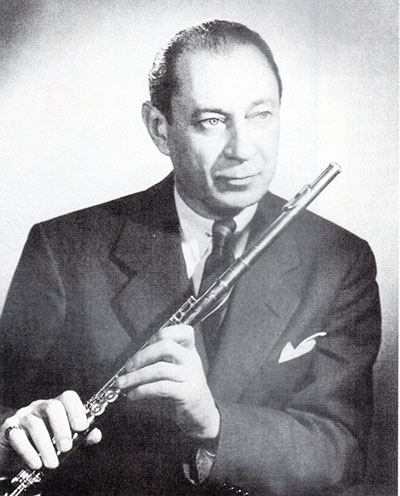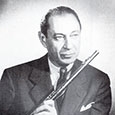
Many a young lad comes into the possession of some kind of a flute or tin whistle, and thereupon proceeds to tootle much to the discomfort of everyone else about. But only here and there do we find a lad producing this tootling with an avidity that promises something worth while later on when a boy eventually becomes the artist.
While still a lad of ten, John Wummer, solo flutist of the Detroit Symphony Orchestra, was in a fair way to master the violin. The violin might still have been his chosen instrument if he had not chanced to find an old six-keyed piccolo of this father’s that had lain away forgotten in a drawer.
Right from the start the boy evinced an unbounded enthusiasm in his find. His father, pleased with such an ardor, and who had some knowledge of the instrument, gave the youngster his first instruction.
John was so infatuated with his piccolo that he used to take it to school, where, at recess, he would indulge in its delight. Even during lessons he could not resist the temptation of taking it from his pocket to do some silent practice. On one of these occasions the teacher discovered his lack of attention to the lesson and forthwith commanded him to come before the class.
As a punishment he was to demonstrate his musical ability. To many a boy this would have been a real predicament, a position of overwhelming embarrassment. To Johnny, however, it was a golden opportunity. The call had come: he was prepared. His solo was such a success that thereafter his playing was a feature of the regular Friday afternoon leisure hour. Incidentally this was his first public appearance in the capacity of a piccolo virtuoso.
At thirteen he was to be found in the band of his home town, Reading, Pennsylvania, and being featured as soloist. By this time he was the proud possessor of a wooden Boehm C flute and a Fred Lax tutor, working hard and teaching himself.
At fifteen he had graduated from the local band and was enjoying life in a theatre pit in Trenton, New Jersey. He now commenced studying with Julius Spindler, in New York. Ambition is a hard taskmaster. John worked harder than ever, practicing whenever he could be at it, even after getting home from the theatre at night.
It was while in Trenton he changed to a silver flute. It happened thus: One cold winter day the temperature of the theatre nearly matched that outside, and while John was practicing before the show the body of his flute cracked. Fortunately he was able to borrow another flute in time, a silver one, however, being the only available. It was so much to his liking that he has played a silver flute ever since.
After one and a half years at Trenton, he studied with Andre Maquarre in Philadelphia, spending nearly three years with this famous flutist and taking up harmony and theory with him in addition to flute. During this time he gained his first symphony orchestra experience at a Bach Festival under Dr. Wolle, at Bethlehem in the company of members from the Philadelphia orchestra.
A little later on he made his debut as an artist with Pryor’s band at Asbury Park. Playing with Pryor at this particular time demonstrated musical ability and self confidence remarkable for one so young. He was the ninth flute player to try out with this organization in a period of six weeks. This cheerful news was imparted to him just before his first concert, by a fellow musician. John admits that it did not tend toward calmness. He played the parts from scores written for band flute and piccolo on his C flute and piccolo, having come direct from the theatre to the band, so acceptably that he continued with Pryor for several seasons.
After Maquarre left Philadelphia, John Wummer went to New York to study with Georges Barrere. His stay in New York lasted several years, during which time he played with numerous organizations, including the Capitol Theatre, and at the Chamber Music Society concerts, also doing some solo work.
The latter years of his New York stay were devoted to Metropolitan engagements and with Simone Mantia’s symphony orchestra at Asbury Park, with which he appeared as soloist.
The musical season of 1923-24 found him as associate first flute of the Detroit Symphony Orchestra, under Ossip Gabrilowitsch. After a year’s absence he is again with the Detroit orchestra, this time as the only first flute. His work with the orchestra is exceptionally fine and many times he is compelled to acknowledge the applause that greets his efforts.
His playing of Bagatelle, a solo for flute with string and harp accompaniment, composed by Victor Kolar, associate conductor at one of the Sunday popular concerts, was one of the outstanding events of the series. The writer was present on this occasion and remembers with pleasure that Mr. Wummer was recalled six or eight times to acknowledge the applause. And when at last he again took his place with the orchestra he had to take another bow, the applause being so prolonged.
In February of this year, at the dedication of the new Masonic temple in Detroit he shared honors with Mme. Luella Melius, playing an obbligato to her singing of the Wren, in which the famous Patti cadenza was done with unusual brilliance. The writer has yet to hear a richer blending of flute and voice than resulted on this occasion. For some time past he has been delighting the vast radio audience with flute solos from station WGHP Detroit, where he also plays with a little symphony orchestra composed of solo members from the Detroit Symphony.
After hearing him play one ceases to wonder why he is such a prime favorite with the musical public here. Possessing a beautiful tone of rare purity and sweetness, a brilliant technique, and greatest of all, a wonderful gift of interpretation by which he is able to reach the hearts of his listeners, he is an artist of exceptional merit.
Mr. Wummer has a repertoire of over forty both flute and piccolo solos, all of which he has committed to memory. It is truly remarkable that at but twenty-six he has attained such a high position in music. Careers such as his are the finest example of what talent plus hard work can accomplish. Of a genial nature and modest disposition, John Wummer is one of the finest fellows one could ever wish to know and treasure as a friend. – Windsor, Ontario, Canada
Editor’s Note: Toscanini invited Wummer to join the N. B.C. symphony orchestra in 1937, and in 1942 Wummer became the principal flutist with the New York Philharmonic, a position he held until his retirement in 1965. He died in San Francisco September 6, 1977.





